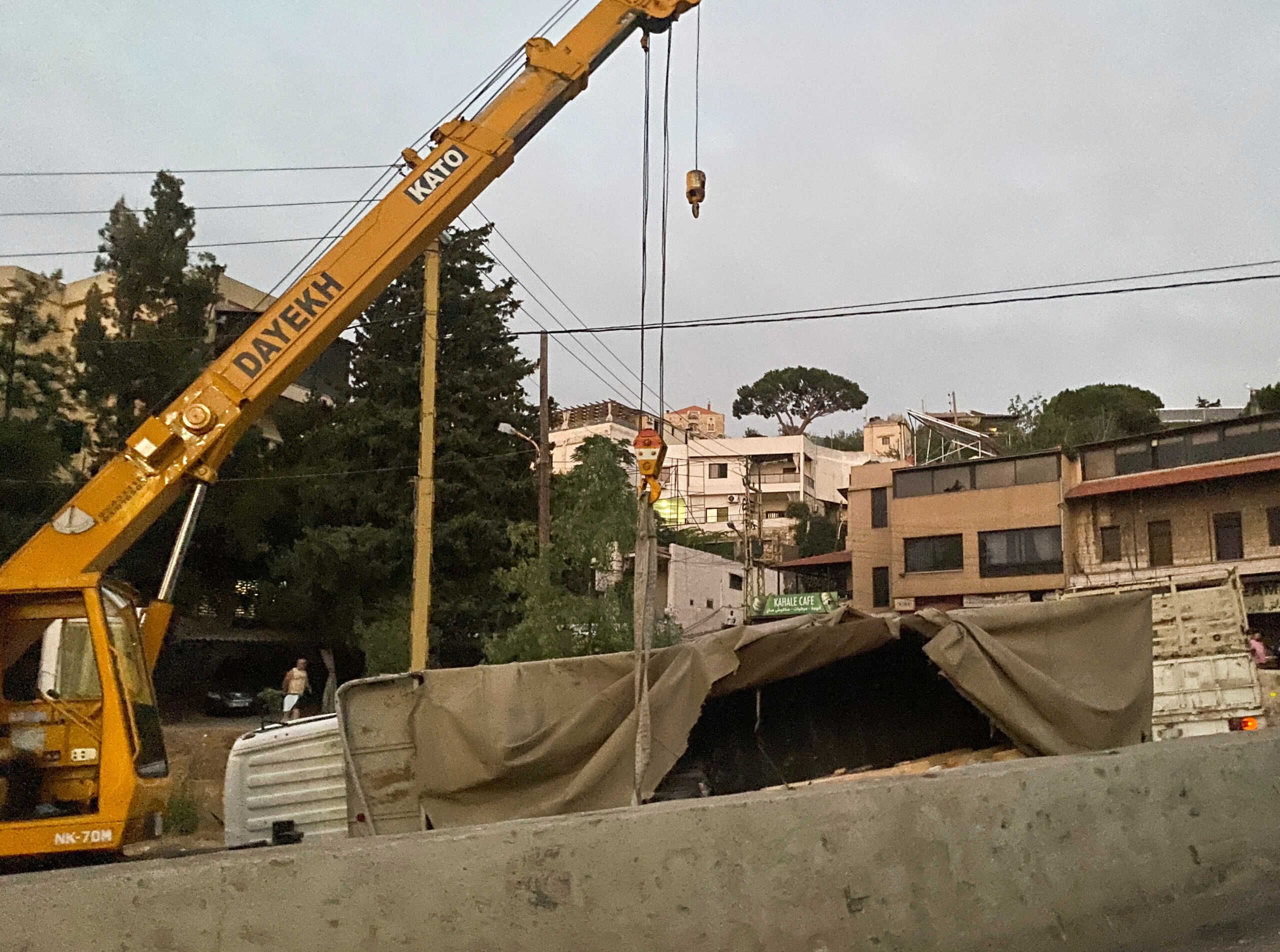On Wednesday, a truck loaded with weapons flipped on the Kahhaleh turn, an area notorious for its hosting of recurrent accidents and dangerous design, as well as for its old history of hosting conflicts between warring factions.
The incident made national headlines, as it was followed by violent fighting between several gunmen. The fighting led to two deaths, now identified as Ahmad Ali Qassas, affiliated with Hezbollah, and Fadi Bajjani, Free Patriotic Movement supporter and former bodyguard of ex-militia commander Elie Hobeika. The clashes had national implications with gunfire and political tensions following immediately.
Details of the Incident
Shortly after the truck flipped on the Kahhaleh turn, various reports stated that local community members approached the truck and were soon met with escorts who surrounded the truck and refused to allow locals to approach it.
Soon after, it was discovered that the truck was carrying weapons and ammunition, and clashes took off between local community members and escorts of the truck, which escalated into violent gunfire.
A reported chronological narrative is that locals approached the truck and were met with armed individuals. After a verbal altercation, locals threw rocks and the escorts fired in the air to clear the area, although it is unclear which event took place first. Locals such as Fadi Bejjani brought arms and consequently direct fighting commenced.
A main issue raised by many across communication platforms was around the reason there was a civilian truck carrying arms in the middle of the road in the first place – many claimed that this was the main instigator of the fighting.
Initially, individuals affiliated with Hezbollah blamed the Lebanese Forces and Kataeb parties of instigation. However, the event uncovered that Fadi Bejjani was a supporter of the Free Patriotic Movement and the former bodyguard of ex-militia commander Elie Hobeika.
Hezbollah on their end claimed ownership over the truck and its contents, and accused “local militias” of starting the conflict by throwing rocks.
In the early morning hours that followed, the truck and its contents were removed and the road was opened again.
Political Implications
Politicians and political groups called for an expeditious investigation into the matter. The Military Public Prosecution indeed began investigations, focused on gathering potential footage from the area, while members from the security apparatus took to the area to gather evidence and the forensic doctor on his part examined the two bodies.
Hezbollah and the Free Patriotic Movement have been allies for a considerable period, mostly represented in the Mar Mikhael agreement that led to the presidency of ex-president Michel Aoun.
However, the relationship between both has turned increasingly volatile lately. It’s unclear whether this incident has had an impact on party-level relationships or whether it was considered as an “individual” event.
The Day After
The next day, funeral processions were accompanied by heavy gunfire in the Shiyyah and/or surrounding areas. The road from Beirut’s city center to the airport, colloquially known as Tariq el Matar, has witnessed the spread of several armed gunmen and sporadic gunfire was heard throughout the area.
More recently, bullets hit the car of Lebanese Minister of Defense Maurice Salim, with photographed evidence showing holes in his car windows. While some sources say he was fired at as part of an assassination attempt, others consider this as a result of falling bullets from the sky-directed gunfire.
In any case, Salim is reported to be physically safe as of the time of writing.
Notably, the area has also been a witness of a longstanding fire in what’s been identified by some as a warehouse, with many residents reporting smells of fire smoke throughout the last week.
Worrying Developments
Lebanese residents have become accustomed to the notion of an absent rock bottom. Wednesday’s incident and Thursday’s developments come shortly after fighting within Palestinian refugee camp Ein el-Hilweh.
Tensions on different fronts have witnessed notable escalations, including but not limited to unregulated arm possession and use, fighting in civilian areas, choice of Lebanese president, refugee forced repatriation and incitement campaigns, calls to kill queer persons, femicides, and many more.
As issues escalate, plans for a way out remain absent, and the country sees itself embroiled in further deterioration.


